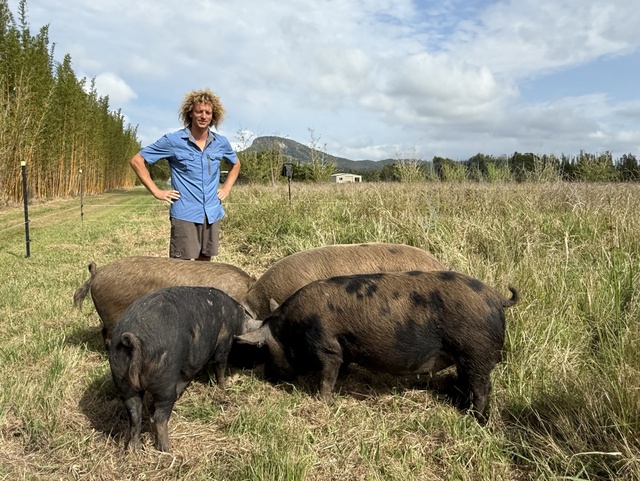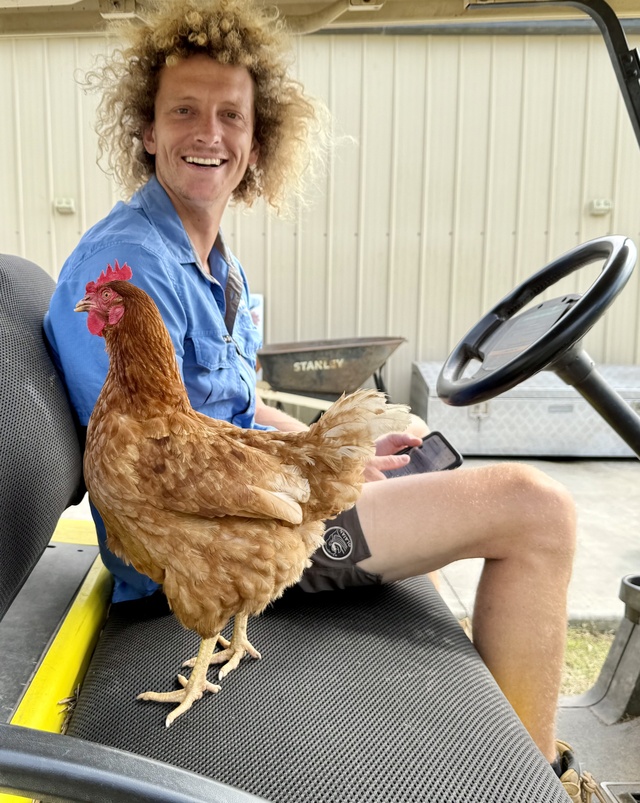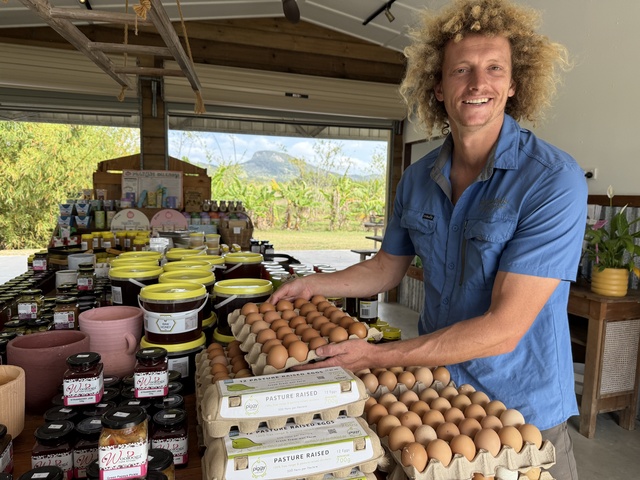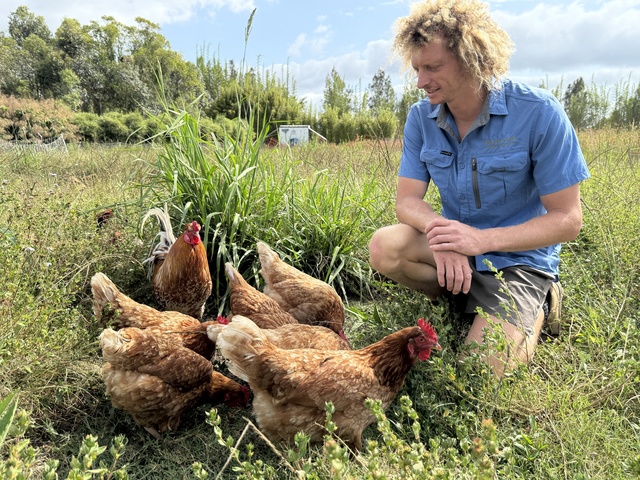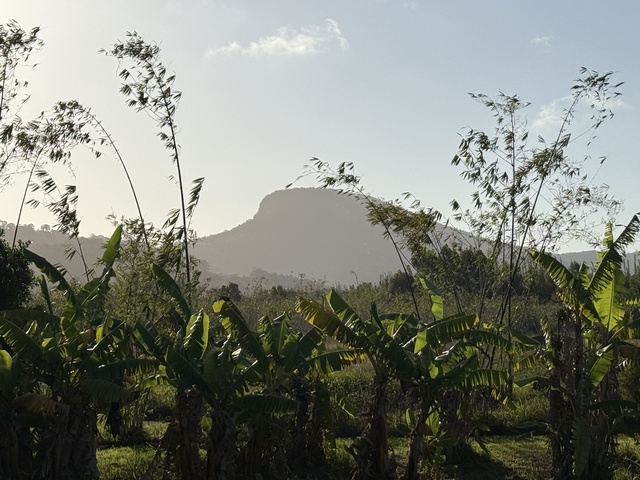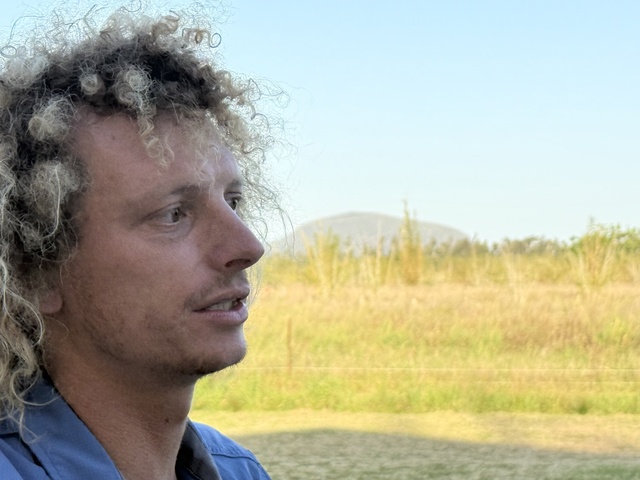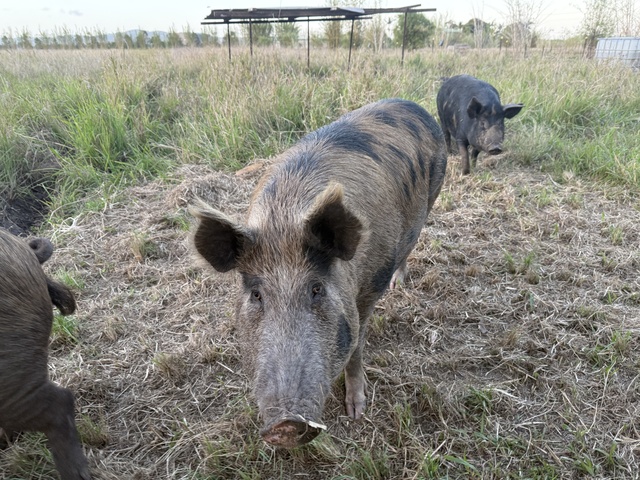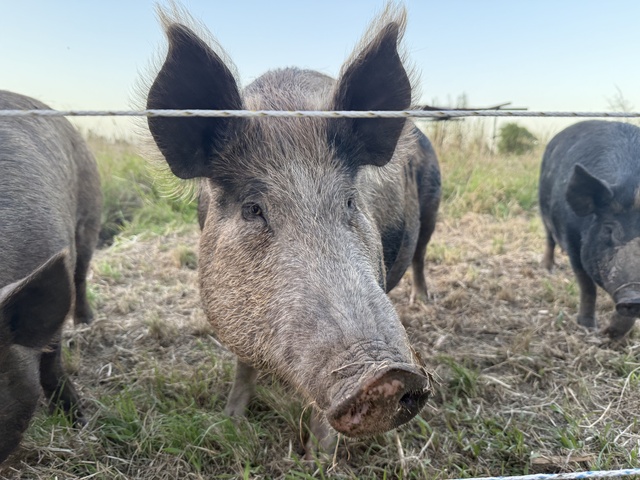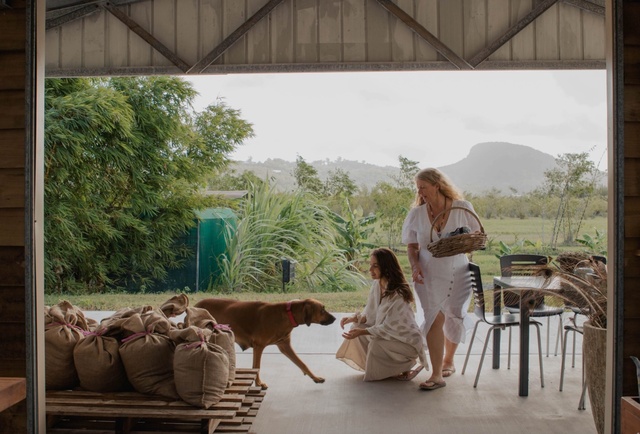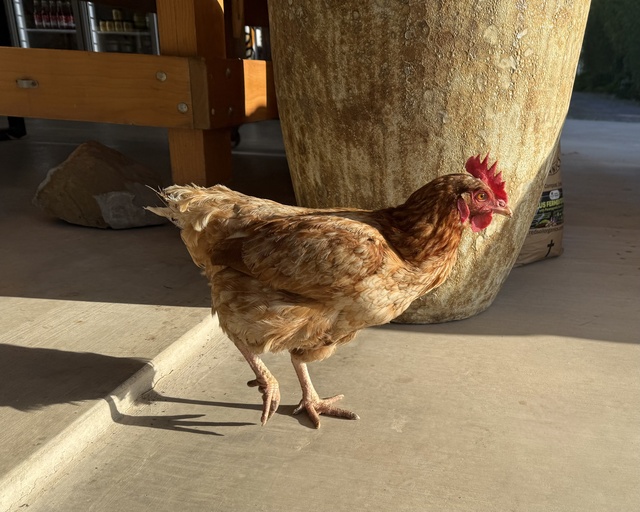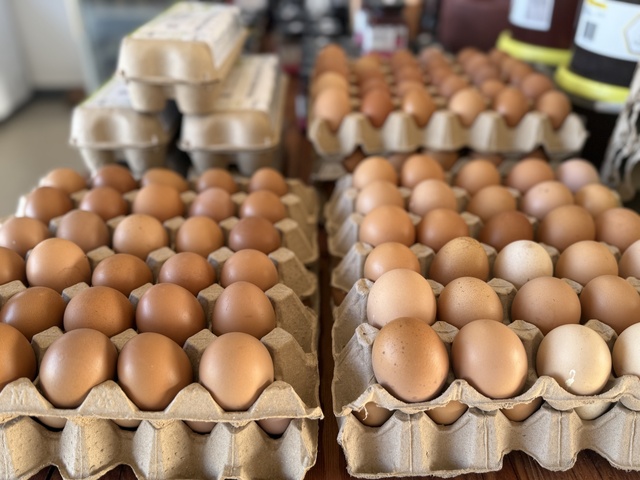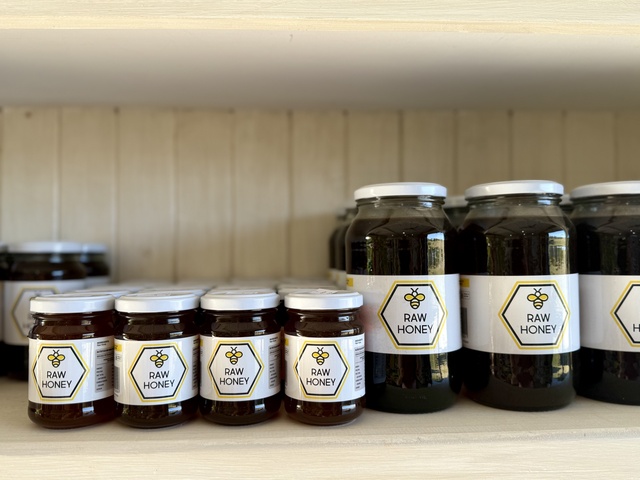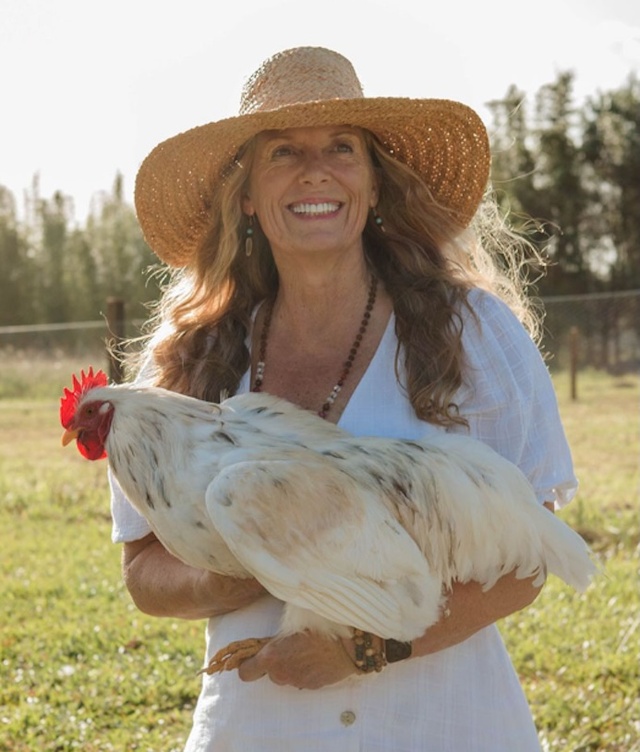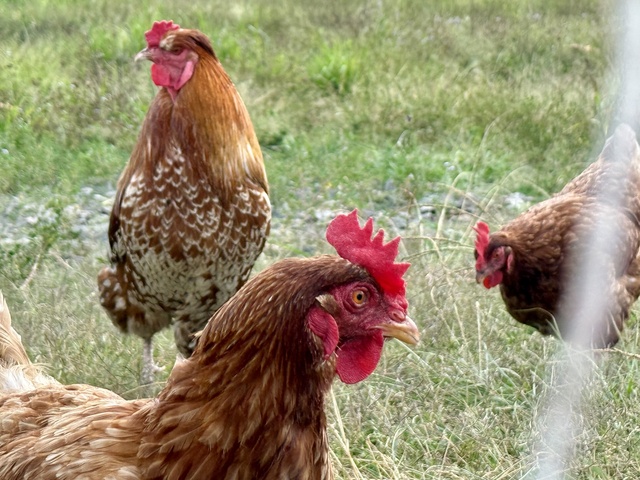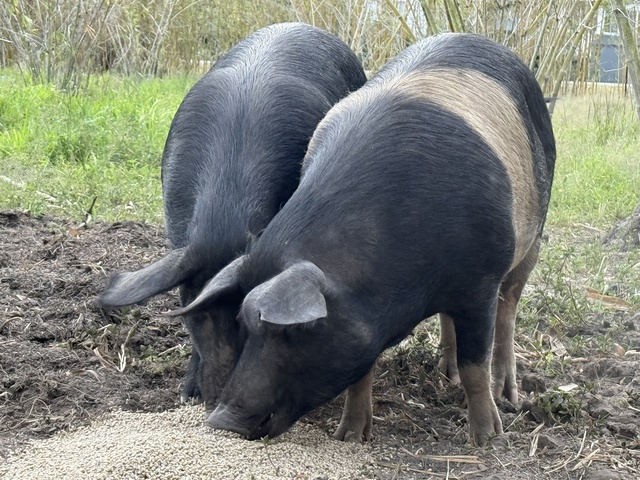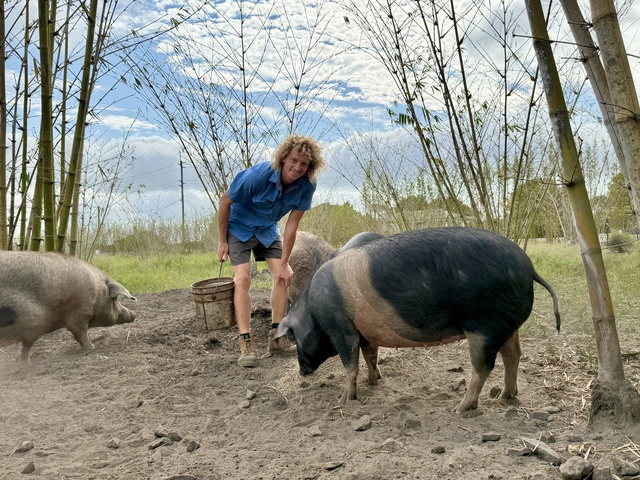Pigs that rock, in close proximity to one of Australia’s biggest rocks in the background, it makes sense – sort of.
We are at Bamboo Park Farm, between Yandina and Coolum Beach. The property was sugar cane land 20-30 years ago.
Today Ed runs ethically-raised pigs, free-range chickens and a farm shop, stocked with local and regional produce including organic honey.
Being caught between a rock and a hard place generally means hard times ahead.
Yet for Ed, he couldn’t be happier. The 40-acre property is between Mt Ninderry and Australia’s third-biggest rock, Mount Coolum.
Originally from Devon in south-western England, Ed has travelled the world and loves living and farming on the Sunshine Coast.
The farm has been transformed from sugar cane to raising heritage Tamworth and Devon Black pigs, together with poultry to produce free-range eggs.
Bamboo Park is on Yandina-Coolum Road and open daily 8am-4pm, stocking not only their own produce but that of others in the region with similar ethical standards.
There is a nursery as well, stocking bamboo, palms, tropical plants and trees.
The pigs have the best lives imaginable, roaming and wallowing in mineral-rich soils, with a natural diet and stress-free lifestyle.
As for Ed, he comes from a family that has strong links to the land and farming.
That was just outside of Exeter, in Devon. It’s good part of England with rolling green country and picturesque English Channel beaches, but still gets quite cold and rainy.
Famous for scones with clotted cream and jam, there’s very good farm shops down there which I suspect has provided inspiration for Ed.
He flew to Australia at the age of 17 as part of the family, went to school at Peregian Springs, and then studied a Bachelor of Arts at the University of Queensland, majoring in International Relations and Spanish.
“Our family is very strong in farming in England. On finishing uni I went travelling and volunteered overseas in some beautiful places.
“I worked at a Cooroy Mountain property for a while then volunteered in Mexico, Belize and Guatemala.
“Cooroy was a 100-acre cattle property and there was heaps of equipment on the farm, so that’s where I learnt to operate all the machines and have brought that knowledge here.
“It was good to see a more conventional approach to farming – the efficiencies and the advantages.
“Free range and better-quality produce is the way to go.”
So why free range? What was the turning point?
“I grew up pretty closely with animals and had a lot to do with them as a kid. It was my grandad’s farm, but my uncle runs them now.
“It was industrial farming – all in sheds, and my uncle is a big-time pork producer. He has a feed company as well.
“My whole story comes from my grandad. My mum‘s dad.
“He grew up on a farm – Hayes Barton. It had a big manor house on it and explorer Sir Walter Raleigh is claimed to have lived there.
“He brought tobacco and potatoes back from America – probably not the healthiest of influences.”
Ed’s grandfather had it as a tenant and took over the farm when he was about 25.
“His dad only had cows and sheep and didn’t make a lot of money from that.
“My grandfather started with pigs – in a young farmers club at the age of 18.
“They gave him two pigs and from those two he just kept on looking after them better and better.
“He developed this pig business over time by attending markets every week and eventually he had about five or six small farms.
Ed’s uncle is now a massive producer, and puts through about 100,000 pigs a year.
Having that background and experienced industrial piggeries, Ed can now see how farming can be done differently.
“Believe me, there are a lot better ways.
“Anyone who has spent that much time with animals, would appreciate looking after them a little bit better.”
Unless you inherited an industrial farming model, you wouldn’t set up one out of the blue, Ed said.
There wasn’t a lot here at Bamboo Park when he took it over. Yet the land is healing itself after being chemical and pesticide-free for such a period of time.
“It seems so obvious yet it’s difficult to explain as to why you would do free range as opposed to pigs and sheds.
“You get better meat and more nutritious meat.”
It’s at this point of the conversation that we hear the peacock calling in the distance, as Ed’s father Dave comes in with the eggs he has collected from the mobile caravan.
“The eggs are excellent,” Ed said, “and people should look for a better quality. Pasture raised. They are such a true indicator.
“If you’ve had a good egg, you can’t go back.”
In this regard, people on the Sunshine Coast are looking for better quality food. It’s been prevalent since the ’70s.
The location of Bamboo Park Farm is central – midway between Coolum and Yandina while at the same time handy to Noosa and Maroochydore or Buderim.
Ed believes this interest in ethically-produced food just happens naturally when you’re travelling and seeing other examples.
“You get to see a lot of different operations in a short period of time. It comes from reading about it – there are a lot of free-range pigs in America.
“The breeds are fascinating. We run mainly Tamworth, which is an old English breed and Duroc is American.
“Tamworth come from the centre of England and they love the big forests. We also have some large Devon Black pigs and they tend to be better suited to the sunlight.
“Pigs get a hard time of it considering how smart they are and how crucial they are to a diet.
“The idea is to have them outdoors and on large enough pasture so that they don’t damage the land.
“We have about 20 breeding pigs over 40 acres. That’s pretty manageable.
“You don’t need to have a high stocking density. We try and rotate them as much as we can.”
This sees the piglets weaned from their mother at about eight weeks and then put into hard pens as a training pen. After one or two weeks they respect that and then they can run outdoors with a single strand electric fence.
Pigs are intensive agriculture and you have to feed them a lot, Ed said, so they are given supplementary feed from Cooloola Custom Stockfeed. It is family owned and only uses Australian whole grains and protein meals with nutritional additives such as vitamins and minerals. No by-products are used in any stockfeed manufactured by the company.
There are some natural legumes as part of the Bamboo Park pastures as well as the grass for nutrition.
The plan is to plant more trees for shade and hopefully incorporate some fruit trees.
“The pigs are a unique animal and have different requirements,” Ed said. “You have to appreciate the full story of industrial pigs to try and understand how to take them forward in the future.
“When grandad built up a large herd, each place in England and in Europe would have pigs that would suit that climate.
“My large blacks are also known as Devon pigs. They do well in the sun as Devon is the warmer part of England.”
The reason Ed’s grandfather got into massive agriculture wasn’t out of greed and bad intentions. It was basically to feed the nation after World War Two.
“Rationing was still going and it was recommended that there be three large industrial breeds of pigs. This was the way to increase food production.
“If you didn’t do that, you would not be efficient enough and could not compete. It did a good job of feeding everyone.”
Since then, there has been the introduction of supermarkets which means customers can now shop at any time for all different types of food.
The question then is how to take it to the next level and improve the quality of the food.
“We try so hard here in the shop to have consistent customers and control the consistency of our products. The customers are so loyal.”
In between the pig and the pork are the butchers. Ed engages the abattoir at Biggenden and his butcher is Piggy In The Middle at Kilkivan.
“What’s fascinating about the price of pork and eggs is they are a good form of protein. By raising them yourselves and having your own butcher, you can be very competitive with price.
“We don’t worry about the other herds. The difference between free-range pigs and industry-raised is so marked.
“The nice thing about selling directly is the quality is so good that we are very proud to sell it.
At Bamboo Park there is no genetically modified organisms (GMO) in the food and no sprays used. The feed does not contain restricted animal material (RAM) such as meat and bone meal, fish, feathers, eggs, and no artificial additives.
They cut some hay and sell quite a lot of that.
Having a mobile chicken coop means the manure can be spread out over the pasture and helps to regenerate the soil.
“There’s a lot of hard infrastructure involved with pigs,” Ed said. “Sheds and fences, and there’s a nice way of recycling a lot of the waste material.
“The amount of corrugated iron, posts and fencing that comes from housing situations. We look at realistic ways to recycle.
“The farm shed has actually come from another property at Coolum.”
It’s a fine line to walk when moving pigs from paddock to paddock.
If you don’t move them enough, it can be damaging to the pasture. But if you do, then it is very beneficial.
With electric fencing, they can be moved every day and the results can be incredible, Ed said.
As far as the farm shed goes, Ed feels his role is to help others where possible – and see some other parts of the country when he goes to their farm or business.
“Customers generally come to the farm gate. I’m not selling just one high-ticket item, I’m selling lots of different produce.
“I’ve been selling plants for years and that’s given me the start for food.
“It’s why large producers can find it tough because they have one product to start them off.
Most of the bamboo has been here about seven years and is proving popular for privacy and screening. There are also palms, heliconias, gingers and ground covers.
“I’ve always liked plants. I propagate some but get small tubes in from wholesalers.
“At the end of the day, it’s about helping people solve any problems they may have. That gave me the capacity to sell food.
“Bamboo can stand up to harsh conditions and is pretty well suited to Australia. You can create a micro climate in places like this. It has its place for sure.”
With the farm shed, Ed is trying to make farmgate supplies more accessible for customers rather than having to go to five different areas.
It’s not just the sharing of the farm shed for other producers, in this way Ed is sharing his knowledge of plants and animals.
“We’re all still learning. With farming, it’s a matter of the more you know – you then realise – there is more you don’t know.”
School children ask such good questions, Ed said, especially about what happens with the supermarkets and why the animals are sent to an abattoir and not the farm.
To see the animals in a free-range situation is very beneficial for the children.
The pigs, in particular, are so curious and have their own personalities which you can see when they run up to the fences.
“They are very sociable,” Ed said. “About the only time that things can go wrong is when their social groups get mixed up.”
“It’s incredible to see my pigs in the paddock compared to an industrial operation.
“As a result of the free ranging, the taste is good. We have customers walking in and asking if it is beef because of the rich colour.
“They love it. They really enjoy it. You don’t have to use antibiotics or stimulants.
“The meat is really excellent.”
Ed is helped on the farm by backpackers on travelling visas.
Having travelled himself, he realises that it’s important to look after the workers.
“It’s interesting producing food on a small farm with people involved, because quite often they will want to buy the food as well.
“That way we can see what they like. You know if the product is good.
“We get a lot of young people come through who are health conscious. This is even if they don’t come from a rural background.
“Quite often we find out they are from an urban background, and that they are probably healthier than me.
Here, we have affordability and quality – the benefit of fresh food as opposed to processed food.”
For Ed, the farm is a beautiful place to live. He’s been on the farm five years but been living in Australia for 15 years.
“I feel very privileged to live here and have developed a deep appreciation of nature in that time.
“Australia is a great country in which you can have a go.”
Travel certainly puts things into context and there is no better illustration than with Ed Wright’s journey.
He grew up on the other side of the world on an industrial style farm and came to Australia to find a healthier and more sustainable lifestyle.
He has arrived at a point in time with a wealth of knowledge and experience, accumulated from the different farming environments around the world.
In doing so, Ed has taken the best of that while learning from others with different strategies, and has created a free-range approach to farming as well as his lifestyle.
It’s inspiring to see how those experiences have impacted him – of going to different places and working with different people.
The environment has supported Ed’s philosophy and in return he has supported a caring philosophy for the environment.

